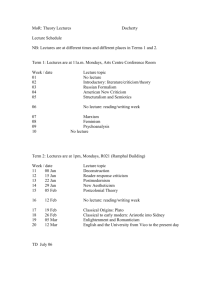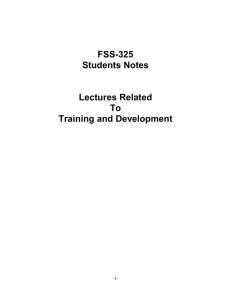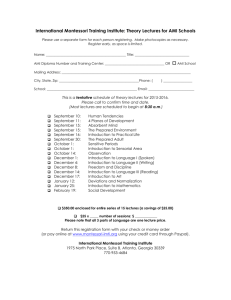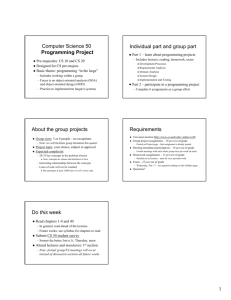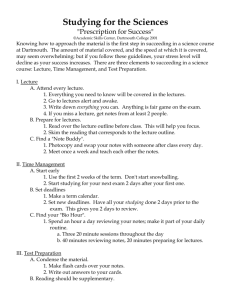ECE 379 is a gentle introduction to the fascinating world of signal
advertisement
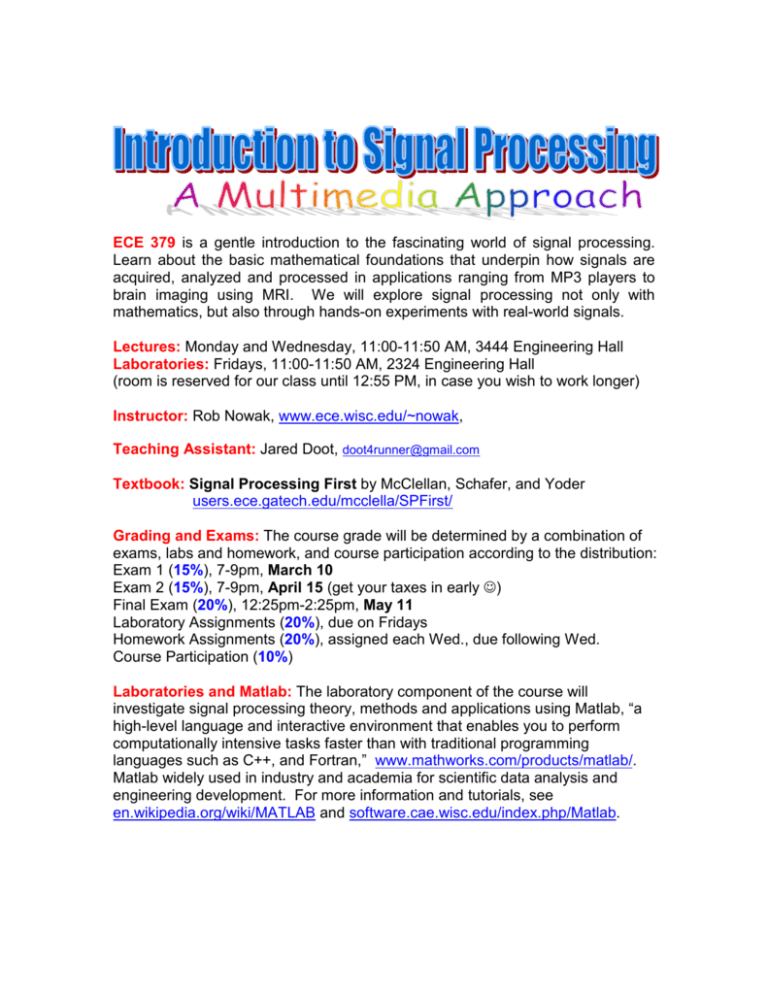
ECE 379 is a gentle introduction to the fascinating world of signal processing. Learn about the basic mathematical foundations that underpin how signals are acquired, analyzed and processed in applications ranging from MP3 players to brain imaging using MRI. We will explore signal processing not only with mathematics, but also through hands-on experiments with real-world signals. Lectures: Monday and Wednesday, 11:00-11:50 AM, 3444 Engineering Hall Laboratories: Fridays, 11:00-11:50 AM, 2324 Engineering Hall (room is reserved for our class until 12:55 PM, in case you wish to work longer) Instructor: Rob Nowak, www.ece.wisc.edu/~nowak, Teaching Assistant: Jared Doot, doot4runner@gmail.com Textbook: Signal Processing First by McClellan, Schafer, and Yoder users.ece.gatech.edu/mcclella/SPFirst/ Grading and Exams: The course grade will be determined by a combination of exams, labs and homework, and course participation according to the distribution: Exam 1 (15%), 7-9pm, March 10 Exam 2 (15%), 7-9pm, April 15 (get your taxes in early ☺) Final Exam (20%), 12:25pm-2:25pm, May 11 Laboratory Assignments (20%), due on Fridays Homework Assignments (20%), assigned each Wed., due following Wed. Course Participation (10%) Laboratories and Matlab: The laboratory component of the course will investigate signal processing theory, methods and applications using Matlab, “a high-level language and interactive environment that enables you to perform computationally intensive tasks faster than with traditional programming languages such as C++, and Fortran,” www.mathworks.com/products/matlab/. Matlab widely used in industry and academia for scientific data analysis and engineering development. For more information and tutorials, see en.wikipedia.org/wiki/MATLAB and software.cae.wisc.edu/index.php/Matlab. ECE 379 Spring 2008 Course Syllabus (lectures and laboratories subject to change) Jan. 23, Jan. 25, 28, 30 Feb. 1 Feb. 4, 6 Feb. 8 Feb. 11, 13 Feb. 15 Feb. 18, 20 Feb. 22 Feb. 25, 27 Feb. 29 March 3, 5 March 7 March 10 March 12 March 14 Lecture 1 “Introduction to Signal Processing,” Chapter 1 Lectures 2-4 “Sinusoidal Signals,” Chapter 2 Laboratory 1 “Introduction to Matlab” Lectures 5-6 “Spectrum Representations,” Chapter 3 Laboratory 2 “Introduction to Complex Numbers and Multipath” Lectures 7-8 “Spectrum Representations,” Chapter 3 Laboratory 3 “AM and FM Sinusoidal Signals” Lectures 8-9 “Analog-to-Digital Conversion,” Chapter 4 Laboratory 4 “Synthesis of Sinusoidal Signals and Music” Lectures 10-11 “The Discrete Time Fourier Series” Chapter 13 Laboratory 5 “The DFT and Spectrum Analysis” Lectures 12-13 “FIR Filters,” Chapter 5 Laboratory 6 “Digital Images: A/D and D/A” Review for Exam 1: Exam 1, 7-9pm Lectures 14 “Frequency Response of FIR Filters,” Chapter 6 No lab Spring Break, March 15-23 March 24-26 March 28 March 31 April 2 April 4 April 7, 9 April 11 April 14 April 16 April 18 April 21, 23 April 25 April 28, 30 May 2 May 5,7 May 9 May 11 Lectures 15-16 “Frequency Response of FIR Filters,” Chapter 6 Laboratory 7 “Sampling, Convolution, and FIR Filtering” Lecture 17 “Continuous-Time Signals & Systems,” Chapter 9 Lecture 18 “Continuous-Time Frequency Response,” Chapter 10 Laboratory 8 “Continuous-Time Convolution” Lectures 19-20 “Continuous-Time Fourier Transform,” Chapter 11 Laboratory 9 “Numerical Calculation of Fourier Series” Review for Exam 2: Exam 2, 7-9pm, April 15 Lecture 21 “Filtering, Modulation and Sampling,” Chapter 12 No lab Lectures 22-23 “Filtering, Modulation and Sampling,” Chapter 12 Laboratory 10 “AM Communication Systems” Lectures 24-25 “Communication Systems and Image Processing” Laboratory 11 “Image Restoration and Enhancement” Lectures 26-37 “Image Processing” No lab, Review for Final Exam Final Exam, 12:25pm-2:25pm
